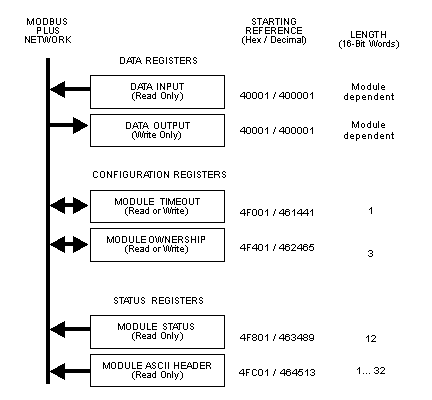Each adapter contains three groups of internal registers that enable the application program to communicate with the I/O base module.
This section describes the three register types, their functions and how they are accessed.
The three types of internal registers are:
-
Data registers
-
Configuration registers
-
Status registers
The application can access the registers through the network to transfer input or output data at the module's field terminals, to set or retrieve the module's configuration, or to monitor its status.
The registers are accessed as 4XXXX references in a controller's application program. Note that the Data Registers are the only ones that can be accessed by the controller's Peer Cop table. All of the registers can be accessed by MSTR function blocks.
Diagram of Register Types
The three groups of internal registers are illustrated in the diagram below.
